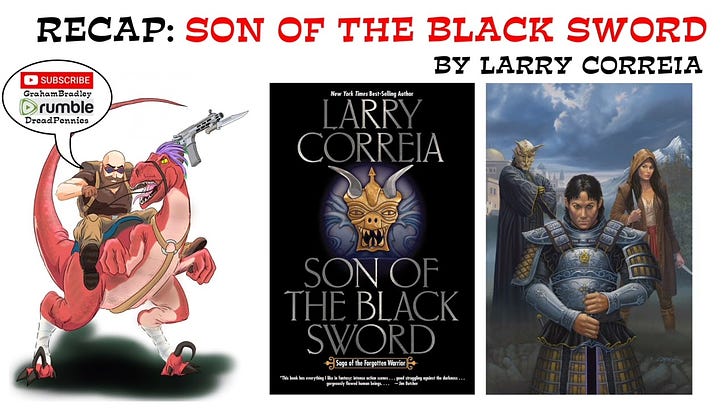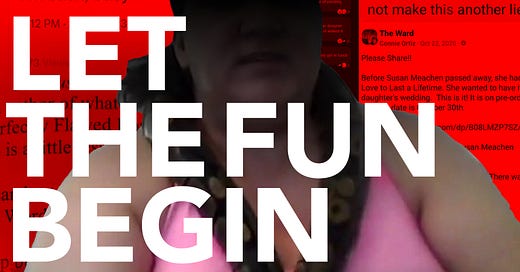
RECAP: Son of the Black Sword, by Larry Correia [SPOILERS]
Saga of the Forgotten Warrior, book 1 of 5
This video is a reading of the text below.
One of the obstacles that prevents readers from enjoying epic fantasy— other than the biggest authors refusing to finish the biggest series— is that they’re often slow, plodding narratives that like to examine the history of every blade of grass, every obscure village custom, every tertiary character’s distant family tree. An epic fantasy book can move slower than rush hour in a snowstorm when you really need a bathroom.
Looking to cure readers of this problem, sci-fi author Larry Correia burst into the genre in 2015 with his first Saga of the Forgotten Warrior novel, SON OF THE BLACK SWORD, an epic fantasy that moves at the pace of a modern-day thriller. And boy does it deliver on this promise. Now that the fourth volume is out, here’s a spoiler-laden recap of Book One.
Set in a fantasy world that feels very much like Southeast Asia, we’re transported to the continent of Lok, where we follow the exploits of Ashok Vadal, a Protector of the land and the bearer of the lethal ancestor blade Angruvadal. Ancestor blades are kind of like Thor’s hammer, in that they can only be wielded by someone they choose, and the bearer has to conduct himself with honor while carrying it. Any shameful or disgraceful act will cause the sword to shatter, and any House that loses its sword is vulnerable to its political enemies.
Unlike Thor’s hammer, ancestor blades aren’t just impossible to lift if you’re not chosen; it’ll force you to hurt yourself and perhaps even commit suicide if it finds you lacking. So if you’re going to try lifting an unclaimed blade, have your affairs in order.
Angruvadal is especially dangerous in the hands of Ashok, who also has powerful magical enhancements and does not possess the capacity to feel fear. This makes him the ideal warrior to deal with seafaring demons that occasionally come on land, and this is where we get a glimpse of the history of this world.
Long ago, there was an Apocalypse-level event where demons rose up out of Hell and the Gods had to send a warrior to vanquish them. He came from the skies in a powerful ship, and he pushed the demons into the sea, where they would remain in an uneasy truce with the humans on land. Men stay out of the water and don’t cross the oceans on ships, demons stay off the surface, and everything’s cool.
The hero, Ramrowan, then created the ancestor blades and bestowed them on mankind to keep the demons at bay. That was centuries ago. Now most of the ancestor blades are shattered and the demons are getting bolder with their incursions, and that’s just the start of things.
After Ashok dispatches a pair of demons in the north of Lok, he gets a summons to return to the Capital and speak to the leader of his order. The Master tells Ashok that his life is a lie, that he’s basically a human forgery created by magic; he was never truly of House Vadal, but rather he was part of the “Casteless” group of laborers, considered under the Law to not even be people. He was a child laborer in a time between swordbearers. It was his job to scrub blood off the floors every time a warrior tried to lift Angruvadal and ended up dead. One night when he was ten, he had to move Angruvadal to clean a spot of blood, and the sword ended up choosing him.
Since House Vadal couldn’t kill Ashok without shattering their blade, they used magic to change his memories and remove his fear, then sent him to the Protectorate in the hopes that their dangerous line of work would make him reckless, lead to his death, and result in the return of Angruvadal to the House.
Solid plan for a bunch of scheming politicos, but it backfired: Ashok became an unstoppable killing machine for the next several years. When he learns his true origins— and that his entire village had been destroyed to hide them— he returns to House Vadal and demands justice.
After he literally cleans house, Ashok turns himself over to the Law for punishment and is thrown in prison. However, Angruvadal doesn’t shatter, and nobody can take it from him, so he becomes a unique legal case requiring deliberation. The Order of Inquisitors decides that rather than execution, Ashok is to flee the prison, find a distant band of religious rebels, and fully ally himself with their cause to liberate the casteless.
As a True Believer in the Law, nothing could be more shameful to Ashok, but he has to comply. He breaks out with Angruvadal and joins up with the zealots, meeting two of their main figureheads, Thera and Keta). Thera is a prophet of the forgotten gods, and Keta is known as the Keeper of Names, a man who knows who everyone truly is.
Ashok deals with the inner turmoil of keeping his loyalty to the Law by working for people who would destroy it. This leads to escalating conflicts along the way, including brutal fights with various bands of scum in different areas of Lok. What Ashok and the others don’t know is that they’re pawns in a larger political scheme, a sort of false-flag Fedpost operation cooked up by the Inquisitors. They want the Casteless to rise up so they have an excuse to eradicate them all, as they are the greatest threat to the secular Law. It is the Casteless who preserve the old religious traditions and there’s just no room for that in a politically “enlightened” age.
What neither the Inquisition nor Ashok could know is that the Forgotten Gods are still around, and they’ve picked their own champion in this conflict.
SON OF THE BLACK SWORD ends with an epic showdown against a lesser villain, Nadan. In the final fight, Ashok cements himself as the hero of the Casteless, Thera is kidnapped by the Inquisition, Angruvadal shatters, and Ashok briefly communes with the spirit of Ramrowan who chooses him as his champion. In a matter of 400 pages or 16 audio hours, we get a very thorough look at the political structure, history, mythology, and characters of a complex but fast-paced world, and things are just getting started.
As a final note, here are some of the other characters you should be familiar with as the series unfolds:
Devedas: a Protector like Ashok, though two years his senior, and with a more established pedigree. Devedas’ father and grandfather were both the bearers of their House’s ancestral blade, however the blade shattered while in his father’s possession and he doesn’t know why. He assumes he would have also become its bearer but without it his future prospects are diminished. He envies Ashok for his blade, and when he learns the truth about Ashok, Devedas is particularly incensed. He is, by all other metrics, a good man and a firm believer in the Law, and he has the loyalty of his subordinate Protectors.
Rada: A librarian tasked with looking up the history of the Casteless during a legal case in which the Capital is considering the outright genocide of all “non-people.” She discovers a discrepancy in the archives along with a conspiracy to subvert the case, but as she pursues the truth, she’s threatened into silence by the Inquisition. Rada disguises herself and seeks out Devedas’ help, and he lends his aid to her cause.
Jagdish: An unremarkable foot soldier in House Vadal who later gets assigned to the prison where Ashok is being held. He trains with Ashok in the hopes that he may someday become worthy of Angruvadal. Throughout the series, Jagdish has one of the best arcs, constantly leveling up from “nameless henchman” to “power player.”
Gutch: A prisoner with strong contacts in the smuggling world, and other elements of the criminal underground. He has an ever-growing role in the series much like Jagdish.
Karno: A hammer-wielding soldier under Devedas’ command, known as “Blunt Karno” for his weapon of choice, as well as his demeanor.
Omand: The Grand Inquisitor and principle villain, pulling strings on all the evil goins-on in the Capital. It is he who sentences Ashok to a life of dishonor among the Casteless rebels.
Sikasso: A member of the House of Assassins, trained wizards who carry out the Inquisition’s evil deeds. He and his ilk attempt to kill Ashok at the final bridge battle; while they succeed in capturing the prophet Thera, Ashok chops off Sikasso’s arm with an axe, forcing him to flee with magic. He’ll be back.
Nadan: A brutal warlord of House Somsak, whose ancestor blade shattered long ago. He tries to duel Ashok for Angruvadal, and ends up getting his tongue cut out for his offensive speech. Later Sikasso furnishes Nadan with the severed tongue of a demon, which fuses with Nadan’s body and gives him the power of speech, simultaneously corrupting him with dark magic. While this makes him a formidable foe, Ashok still defeats him in battle.
I love this book. I’ve read it four times and I’ll read it many more. Correia is currently at work on the fifth and final installment. Stay tuned for my next recap in this series, HOUSE OF ASSASSINS.




![[PDF] Son Of The Black Sword Saga Of The Forgotten Warrior - Free Ebook ... [PDF] Son Of The Black Sword Saga Of The Forgotten Warrior - Free Ebook ...](https://substackcdn.com/image/fetch/w_1456,c_limit,f_auto,q_auto:good,fl_progressive:steep/https%3A%2F%2Fsubstack-post-media.s3.amazonaws.com%2Fpublic%2Fimages%2F29fffa73-3c9e-4f34-940d-3cae1854fdd6_1400x2128.jpeg)










